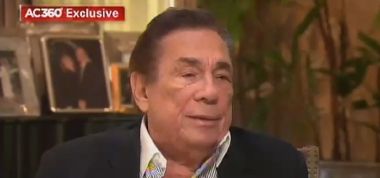Disgraced Clippers owner Donald Sterling refuses to pay NBA fine, threatens to sue

Three days after apologizing for making racist statements in a secretly recorded audiotape, Los Angeles Clippers owner Donald Sterling threatened to sue the NBA, and announced that he will not pay the league's $2.5 million fine.
According to an article published yesterday, Sterling's attorney, Maxwell Blecher, sent a letter to NBA Executive Vice President and general counsel Rick Buchanan stating that Sterling had done no wrong.
"No punishment is warranted," the letter allegedly read, according to Sports Illustrated. The letter also warned the NBA that demands for Sterling to resign ownership of the team "will be adjudicated."
Sterling came under fire on April 25 when a recorded conversation he had with then girlfriend, V. Stiviano, was leaked to the media.
In the April 9 recording, Sterling is upset that Stiviano took a picture with NBA legend Magic Johnson, and posted it to her Instagram page. He went on to chastise her for taking pictures and socializing with black people.
"It bothers me a lot that you want to broadcast that you're associating with black people," he said. "Do you have to?"
An extended audiotape was released on Deadspin on April 27 in which Sterling told Stiviano about the material possessions he enables his black NBA players to buy, and relates the African-American experience to the treatment of black Jews in Israel.
Sterling admitted that it was him on the tapes and apologized in a May 12 interview.
"I'm not a racist," he told CNN. "I love people. I always have. But those words came out of my mouth, I guess. And I'm so sorry. And I'm so apologetic."
NBA Commissioner Adam Silver banned Sterling from the league on April 29, and ordered him to pay a $2.5 million fine, which he now refuses.
"We reject your demand for payment," Blecher allegedly informed the NBA.
Sterling's attorney also argued that his client has not violated the NBA's constitution, and that his due process rights were violated.
Belcher was part of a team of attorneys that won a 1981 case against the NFL, resulting in the Raiders' move from Oakland to Los Angeles.











